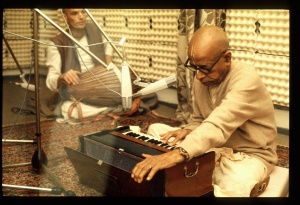CC Madhya 19.205: Difference between revisions
No edit summary |
(Vanibot #0054 edit - transform synonyms into clickable links, which search similar occurrences) |
||
| Line 19: | Line 19: | ||
<div class="synonyms"> | <div class="synonyms"> | ||
''tam'' | ''[//vanipedia.org/wiki/Special:VaniSearch?s=tam&tab=syno_o&ds=1 tam]'' — Him (Kṛṣṇa); ''[//vanipedia.org/wiki/Special:VaniSearch?s=matvā&tab=syno_o&ds=1 matvā]'' — considering; ''[//vanipedia.org/wiki/Special:VaniSearch?s=ātmajam&tab=syno_o&ds=1 ātmajam]'' — own son; ''[//vanipedia.org/wiki/Special:VaniSearch?s=avyaktam&tab=syno_o&ds=1 avyaktam]'' — unmanifested; ''[//vanipedia.org/wiki/Special:VaniSearch?s=martya&tab=syno_o&ds=1 martya]-[//vanipedia.org/wiki/Special:VaniSearch?s=liṅgam&tab=syno_o&ds=1 liṅgam]'' — manifested as if perishable; ''[//vanipedia.org/wiki/Special:VaniSearch?s=adhokṣajam&tab=syno_o&ds=1 adhokṣajam]'' — beyond the perception of the senses; ''[//vanipedia.org/wiki/Special:VaniSearch?s=gopikā&tab=syno_o&ds=1 gopikā]'' — mother Yaśodā; ''[//vanipedia.org/wiki/Special:VaniSearch?s=ulūkhale&tab=syno_o&ds=1 ulūkhale]'' — to the mortar; ''[//vanipedia.org/wiki/Special:VaniSearch?s=dāmnā&tab=syno_o&ds=1 dāmnā]'' — with rope; ''[//vanipedia.org/wiki/Special:VaniSearch?s=babandha&tab=syno_o&ds=1 babandha]'' — bound; ''[//vanipedia.org/wiki/Special:VaniSearch?s=prākṛtam&tab=syno_o&ds=1 prākṛtam]'' — an ordinary child; ''[//vanipedia.org/wiki/Special:VaniSearch?s=yathā&tab=syno_o&ds=1 yathā]'' — like. | ||
</div> | </div> | ||
Latest revision as of 22:28, 19 February 2024

A.C. Bhaktivedanta Swami Prabhupada
TEXT 205
- taṁ matvātmajam avyaktaṁ
- martya-liṅgam adhokṣajam
- gopikolūkhale dāmnā
- babandha prākṛtaṁ yathā
SYNONYMS
tam — Him (Kṛṣṇa); matvā — considering; ātmajam — own son; avyaktam — unmanifested; martya-liṅgam — manifested as if perishable; adhokṣajam — beyond the perception of the senses; gopikā — mother Yaśodā; ulūkhale — to the mortar; dāmnā — with rope; babandha — bound; prākṛtam — an ordinary child; yathā — like.
TRANSLATION
“‘Although Kṛṣṇa is beyond sense perception and is unmanifest to human beings, He takes up the guise of a human being with a material body. Thus mother Yaśodā thought Him to be her son, and she bound Lord Kṛṣṇa with rope to a wooden mortar, as if He were an ordinary child.’
PURPORT
This verse from Śrīmad-Bhāgavatam (SB 10.9.14) is in reference to Lord Kṛṣṇa’s exhibiting Himself like an ordinary child before mother Yaśodā. He was playing like a naughty boy, stealing butter and breaking butter pots. Mother Yaśodā became disturbed and wanted to bind the Lord to a mortar used for pounding spices. In other words, she considered the Supreme Personality of Godhead an ordinary child.